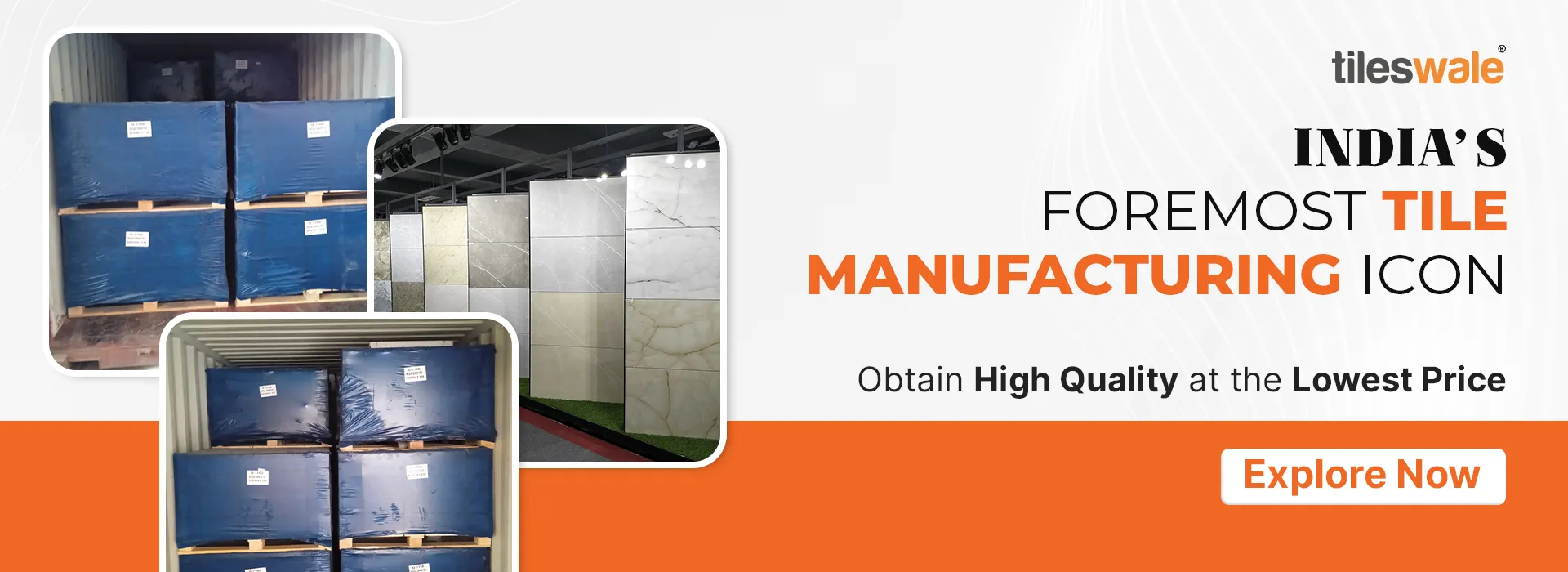
World's First Ceramic-Tile & Sanitaryware Live Marketplace. Get it on Google Play
Get it on App Store
World's First Ceramic-Tile & Sanitaryware Live Marketplace. Get it on Google Play
Get it on App Store
By Tileswale
Cork flooring is an excellent choice for any home, as it is a renewable resource and an eco-friendly option that is both durable and easy to maintain. Cork is comfortable underfoot, making cork flooring a great choice for families with kids or pets.
Unlike many other flooring materials that absorb heat, cork has inherently thermal insulation qualities which help keep the home cool during warm months and warm during cold temperatures. In addition, cork provides some sound-dampening properties so you can block out noise from other parts of the house or outside world. Its natural color allows cork flooring to complement any type of decor and its natural pattern gives the room depth and dimension with various textures available in cork finishes.
With all its benefits on top of being stylish and modern, cork flooring is a great way to liven up any living space!
Most of you plan to invest in a flooring option, designed to last the longest. People are mostly inclined towards wall paints and the interior décor, and they don’t quite pay head towards all the possible flooring options. However, if you are looking for a mess-free alternative to hardwood flooring, then nothing beats the cake much like cork flooring.
1. Heritage mill
2. APC Cork
3. iCrok Floor
4. WE Cork:
5. Globus Cork Flooring:
From the points mentioned above, you are pretty sure why there is a booming growth of cork flooring these days. Now, let’s talk about the top 5 brands, known to be the best manufacturers of such eco-friendly flooring options.
This brand of cork flooring can be seen as sold in Home Depot stores. There are two versions of floating plank cork items available under this brand name. The prices are subject to range from $1.99 to $3.09 per square foot.
https://www.heritagemillfloors.com/
If you are looking for the leading supplier of cork floors across North America, APC Cork is the name to focus on. This company presents multiple lines of glue-down and floating cork tiles and planks. In total, there are 87 styles and you can get this brand through a network of specialty flooring stores.
Known as a factory-direct distributor of cork flooring, iCork Floor sells to consumers directly through its website. The pricing on both glue-down and floating floors is pretty economical.
If you are looking for a brand selling multiple lines of cork planks and tiles in assorted styles and sizes then WE Cork is the name to be. There are different shapes of glue-down and floating versions to choose from.
Globus Cork Flooring is here to ship the flooring products from its New York factory outlet. At present, you will get 38 colors of cork tiles from this brand in 34 different sizes.
Now you are well aware of cork flooring and why you must get one for your residential unit. Be sure to check out these brands individually, before investing.
The entire cork floor is made from the bark of a cork tree. It is highly eco-friendly and won’t harm the tree from continuing growing. The bark is first finely grounded into fine materials and then mechanically processed to form into sheets. Later, those sheets are baked to create tiles.
These tiles will be the perfect material for manufacturing cork flooring. Not just meant for residential addresses, but cork floors are highly popular in official areas. If you are planning to design some lighter commercial locations, cork might be your saviour for the same.
If you are looking for a safe alternative to hardwood flooring, cork is your answer. The comfortable cushiony feel that comes with cork makes it easier if you have hyperactive kids or pets at home. Even if they fall, the floor makes it sure they won’t get hurt that easily.
On the other hand, the cork flooring is pretty safe. It is known for its fire-resistant features. So, the floor will only ignite into flames at higher temperatures.
Being a completely eco-friendly material, cork can resist the formation of mildew, mould and termites. That’s why most people rely on it for its anti-microbial features. But, there is one thing to care about with corks and that is the staining. Cork flooring can stain pretty fast. So, even if you ever spill wine or any drinks on it, make sure to wipe that off instantly!
It is true that learning everything that cork flooring holds is important, before you get to finalize on the investment. Yes, it takes some time to go through all the options before giving it one a shot, but it is worth the time that you are planning to invest from here.
The thermal properties of cork naturally help to create an inexpensive alternative to the heating wooden floor. It has an R-value of 3.0 per inch of thickness. It talks about the warmth emitted from the floor. So, for the radiant floor heating option, cork flooring is a great choice.
Like most DIY wooden floors, the engineered cork flooring options are fitted well with a clock-lock system. That makes it easier to place the planks, without any secondary helping hand. It is as easy to install as laminate or vinyl options. As these click-lock planks help to create a floating floor, you can install them over existing ones. The old and new planks will just snap together.
Cork happens to be one of the most eco-friendly options for your floor. With a maturation period of 20 years, the cork oak trees can easily be harvested once every 9 to 10 years. On the other hand, hardwood trees take decades to mature. Once they are cut down, that’s the end of it.
However, for cork flooring, only the bark is used. So, the tree will start to grow as it is. That makes cork an ultra-green and sustainable option for flooring.
Due to the tiny little air pockets within the material, cork gets sound-dampening acoustic properties. Now you must be wondering how many tiny little air pockets are there. Well, there are around 40 million of them per cubic centimetre!
The quiet nature of the cork can pair perfectly with living rooms, bedrooms, and children’s playrooms, to name a few. Anywhere you want to dampen the noise, cork flooring is your answer. If you can’t make up your mind on hardwood or carpet flooring for your bedroom, cork is the best middle ground.
The tiny little air pockets will make them kind to your body as well. The spongy yet firm quality is highly suitable for your joints. It provides extra support to ease joint and back pain. So, if you spend a lot of time on your feet, the cork will be a smart move for flooring.
Cork flooring won’t be a great call if your space has enough natural sunlight. Long exposure to direct sunlight will make the cork turn yellow and then fade.
Unlike some hardwood flooring, cork flooring expands and contracts in all possible directions. It means that such floors won’t love changes in humidity.
This is the biggest disadvantage of cork flooring. Cork flooring is not waterproof and there is a high chance it will absorb water. That’s not good for the floor’s longevity.
You cannot pinpoint a particular rate for the cork floor. It varies from one individual to another, depending on the area to cover and the features of the cork planks. On a general basis, you can spend as low as $2 to as high as $12 for each plank piece.
Multiple features help in determining the pricing factor. It is not just about the thickness of the material, but how professionally you are able to install it will mark a change in the price point.
With cork flooring, there are two major types of installation procedures. The more traditional installation method is the adhesive connection.
Here, the flooring tiles will be acclaimed to the environment inside the installation room.
Then a subfloor is prepared, like the plywood one or cement board. It needs to be clean, even, and free from any kind of moisture.
The application of adhesive is a glue-down or contact method for fully securing the tiles as they might curl up towards the edges if failed to bond properly.
This installation form starts with the cork flooring, which is mostly created to offer a tongue-and-groove connection. Here, the planks will snap together.
Unlike any proper specifications for the subfloor in the adhesive method, this floating floor allows the cork floor to get installed on top of existing flooring options like vinyl, ceramic tile, or even wood.
When needed, you can remove the cork flooring anytime and replace it with a separate style preference.
You must always remember that the cork flooring will react to humidity changes. So, there needs to be some room left for its expansion while installation. Once you have planned to install cork flooring, you will expect some benefits from the items.
The best part about cork floors is that you can simply work on your daily cleaning routine to enhance the aesthetic value of the floor big time.
It is important to wipe off spills immediately to prevent staining.
There is a seal coat on top of the cork flooring, which needs to be renewed periodically.
Be sure that the cork flooring does not get scratched by your pets.
The main downside to cork flooring is that it can be easily damaged by moisture and high humidity. Additionally, since cork is a softer material, it can dent or scratch more easily than other materials such as hardwood or tile.
Yes, cork flooring is a great idea. It has many benefits, such as being water resistant, sound absorbent, and eco-friendly. Plus, it adds a warm and inviting touch to any room.
Cork floors typically last for between 20-30 years if maintained properly. With proper care and maintenance, cork floors can even last up to 40 years.
Article Updated:- 14 December 2022
Submit your inquiries, we will see the rest
size:
Quantity:

+ Requirements

We have received your Inquiry. We will soon connect you with relevent Sellers via tileswale App. download now!!

